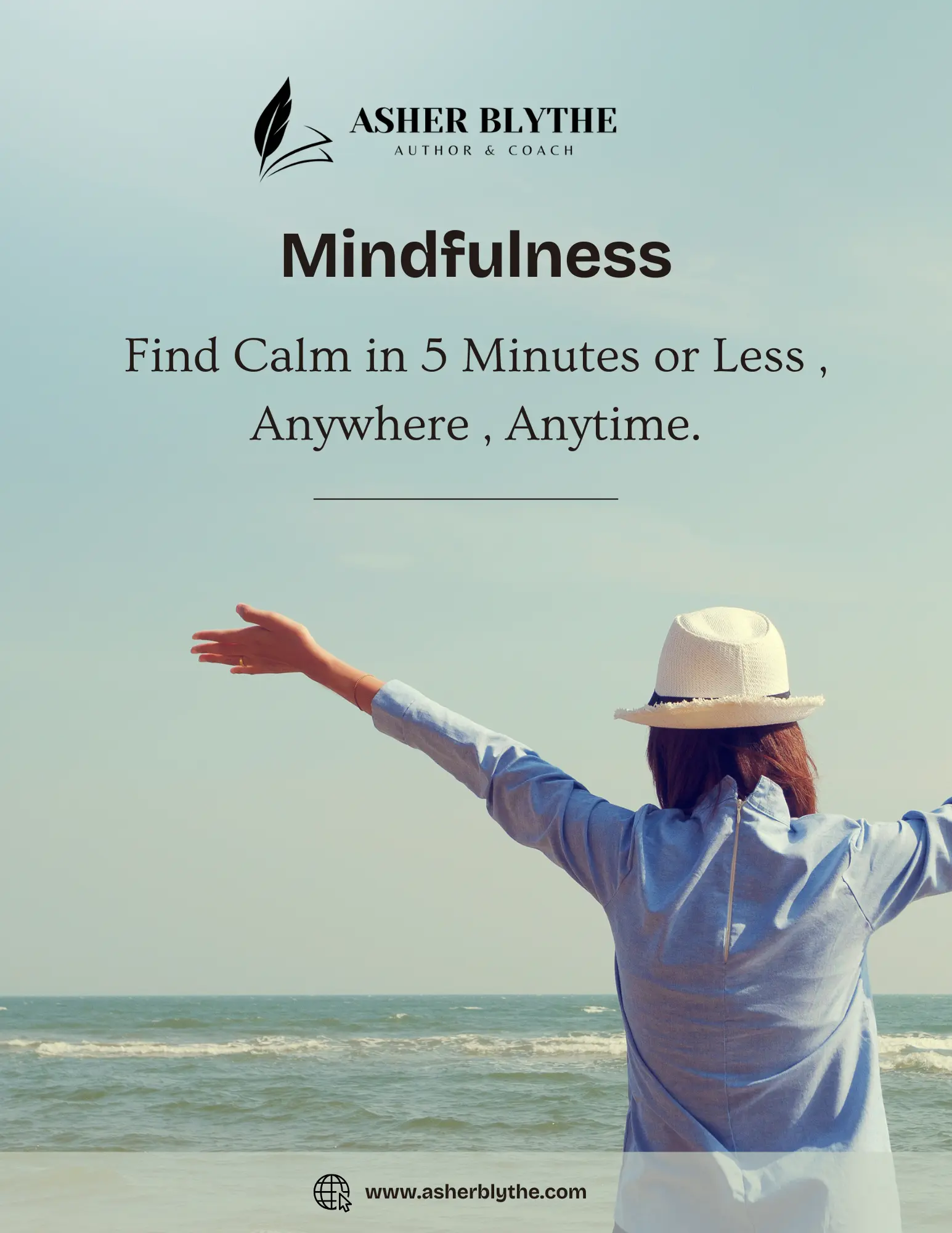Best Books on Mindful Living: A Guide to Transformative Reads
Exploring mindful living can transform daily experiences by cultivating awareness and presence. Readers looking for the best books on mindfulness will find a treasure trove of insights and techniques to enhance their practice and enrich their lives.

Asher Blythe
Mindfulness Coach & Author
Exploring mindful living can transform daily experiences by cultivating awareness and presence. Readers looking for the best books on mindfulness will find a treasure trove of insights and techniques to enhance their practice and enrich their lives. These books offer practical guidance on incorporating mindfulness into everyday activities, promoting a more intentional and fulfilling lifestyle.

A variety of authors explore topics like meditation, gratitude, and stress reduction. By engaging with these works, readers gain access to tools for fostering emotional well-being and clarity. Whether you're a newcomer to mindfulness or looking to deepen existing practices, each book provides unique perspectives that can resonate with different aspects of life.
The pursuit of mindful living encourages a more reflective approach to experiencing the world. By selecting a book that resonates with personal goals, readers can embark on a journey toward a more balanced and mindful existence.
What Is Mindful Living?

Mindful living emphasizes present-moment awareness, fostering a deeper connection to oneself and the environment. It integrates deliberate focus and intention into daily activities, promoting a balanced and fulfilling life.
Core Principles of Mindfulness
Mindfulness is grounded in several key principles. Awareness is central, involving a conscious presence in each moment, without judgment. Acceptance encourages recognizing thoughts and feelings as they are, rather than how one wishes them to be.
Intentionality plays a vital role, guiding actions with purpose rather than autopilot reactivity. These principles form the foundation that supports a mindful lifestyle.
Benefits of Mindful Living
Practicing mindful living offers a multitude of advantages. Stress reduction is one significant benefit, as mindfulness promotes relaxation and diminishes anxiety.
Improved focus and enhanced emotional regulation are further gains, empowering individuals to face challenges with clarity and composure. Relationships may also improve, as mindfulness fosters empathy and patience in interactions. These benefits culminate in increased overall well-being.
Common Myths About Mindfulness
Many misconceptions surround mindfulness. One common myth is that it requires long meditative practices, but mindfulness can be incorporated into short, everyday activities.
Another false belief is that mindfulness means eliminating thoughts. In truth, it involves observing thoughts without attachment. Some assume it conflicts with goals, when in fact, mindfulness can enhance goal-setting by providing clarity and focus. Addressing these myths helps in understanding mindfulness more accurately.
How to Choose the Best Books on Mindful Living
Selecting the right book on mindful living involves understanding personal mindfulness goals, recognizing various types of books available, and evaluating the expertise of authors. Each factor plays a crucial role in finding a book that meets individual needs and contributes effectively to personal growth.
Identifying Your Mindfulness Goals
Understanding one's mindfulness goals is essential in choosing the best book. Mindful living encompasses diverse goals such as stress reduction, improving mental health, or enhancing daily mindfulness practices. Being clear about specific objectives helps in selecting a book that addresses those needs directly.
For someone focusing on stress relief, a book offering meditation techniques and breathing exercises might be ideal. If the goal is to integrate mindfulness into daily routines, look for books that emphasize practical applications and daily rituals. By aligning book content with personal aspirations, readers can ensure a more rewarding and impactful experience.
Types of Mindful Living Books
Books on mindful living come in various forms, offering different approaches to mindfulness practice. Some might be instructional guides detailing techniques and exercises, while others may take a narrative approach, sharing personal experiences or philosophical insights. Understanding these variations aids in picking a book that aligns with one's preferences.
Instructional guides typically offer step-by-step processes and are filled with exercises to help develop mindful habits. Memoir or narrative-style books can provide inspiration through stories of personal journeys and challenges. Philosophical or theoretical texts might suit those interested in the deeper concepts of mindfulness and existence. Consider how you best absorb information and what type of content resonates most with you.
Evaluating Author Credentials
Author credentials are a crucial consideration when selecting a book on mindful living. An author with extensive experience and background in mindfulness or related fields can offer more reliable and valid information. Readers should look for authors who have a well-established reputation through publications, workshops, or academic credentials in mindfulness or psychology.
Researching the author's background can provide insights into the quality and authenticity of the content. Books from authors who are certified instructors, psychologists, or have decades of practice can offer depth and practical insights. Checking reviews, summaries, and author bios can add assurance regarding the credibility and relevance of the book's content.
Recommended Classics on Mindful Living

Exploring classic books on mindful living offers insights into the foundational concepts and enduring practices of mindfulness. These works have inspired countless readers by providing practical advice and unique perspectives.
Influential Early Works
Among the early influential works, "The Miracle of Mindfulness" by Thich Nhat Hanh stands out. Written with profound simplicity, it encourages readers to find peace in the present moment. Using clear instructions and relatable anecdotes, Thich Nhat Hanh effectively conveys the essence of mindfulness practices.
"Zen Mind, Beginner’s Mind" by Shunryu Suzuki is another pivotal work. This book emphasizes the importance of maintaining a fresh perspective through a "beginner’s mind." Suzuki presents the core principles of Zen, inviting readers to explore their inner reality with clarity and openness.
"The Heart of the Buddha's Teaching" by Thich Nhat Hanh also contributes significantly to early mindfulness literature. It introduces the essential elements of Buddhist philosophy in a way that's accessible to modern readers, focusing on how these teachings can enhance mindful living.
Timeless Bestsellers
Eckhart Tolle’s "The Power of Now" is featured prominently among bestsellers on mindful living. It emphasizes living fully in the present, providing actionable insights into letting go of past regrets and future anxieties. Tolle’s work is known for its transformative impact on readers seeking deeper self-awareness.
"Wherever You Go, There You Are" by Jon Kabat-Zinn is another enduring bestseller. Kabat-Zinn is a pioneer in bringing mindfulness to the Western audience. His approachable style makes mindfulness accessible to readers from all backgrounds, offering guidance and exercises to integrate mindfulness into everyday life.
Lastly, Daniel J. Siegel's "Mindsight" combines mindfulness with neuroscience, exploring how self-awareness can foster emotional and mental health. Siegel's ability to explain complex concepts in straightforward terms makes this book both enlightening and practical for those interested in the intersection of mindfulness and science.
Contemporary Mindful Living Books

In recent years, new authors have introduced fresh perspectives to mindfulness, utilizing modern approaches that resonate with today's readers. Contemporary books focus on practical applications, helping individuals integrate mindfulness seamlessly into their daily lives.
Modern Approaches to Mindfulness
Modern mindfulness books often emphasize incorporating mindful practices into busy schedules. These texts prioritize simplicity, with straightforward exercises that readers can implement immediately.
Technology and mindfulness have merged in some works, offering digital tools and apps to complement traditional reading. Authors focus on accessible language, making mindfulness less daunting and more relatable for beginners.
Notable titles frequently address stress reduction and mental clarity, equipping readers with strategies to navigate the fast-paced modern world. The emphasis is often on scientifically-backed practices, with sections covering the benefits of mindfulness in various settings such as the workplace or home.
Fresh Voices and Perspectives
New voices in the mindfulness genre bring diverse experiences and cultural backgrounds. These authors offer unique perspectives, expanding the understanding of mindfulness practices beyond traditional narratives.
Some writers integrate personal anecdotes and stories, guiding readers through relatable journeys. This approach can foster a deeper emotional connection, making the concepts more memorable and impactful.
Many contemporary authors highlight inclusivity, addressing diverse audiences with different needs and lifestyles. This variety ensures that readers can find a book that reflects their personal context, encouraging engagement and sustained interest in mindfulness practices.
Mindful Living Books for Beginners

Books on mindful living for beginners often feature step-by-step guides and accessible language. These resources help newcomers build foundational practices without feeling overwhelmed.
Step-by-Step Guides
Books with step-by-step guides are ideal for beginners, providing clear instructions. "The Miracle of Mindfulness" by Thich Nhat Hanh offers pragmatic exercises for cultivating awareness. With structured routines, readers learn to embed mindfulness into daily life, making the process manageable.
Another option is "Mindfulness: An Eight-Week Plan for Finding Peace in a Frantic World" by Mark Williams and Danny Penman. It's a structured program that spans over eight weeks, focusing on practical application. The authors guide the reader through meditation practices and simple habits to reduce stress and promote well-being.
Accessible Language and Exercises
Books written in accessible language ensure readers grasp complex mindfulness concepts with ease. "Wherever You Go, There You Are" by Jon Kabat-Zinn delivers insights in a straightforward tone. This makes the subject approachable for anyone new to mindfulness.
Exercises in these books vary from short breathing exercises to more detailed meditations, appealing to those at different levels of their mindfulness journey. "How to Train a Wild Elephant: And Other Adventures in Mindfulness" by Jan Chozen Bays includes everyday exercises designed to integrate mindfulness into one's lifestyle seamlessly.
Advanced Mindfulness Reading
For those with foundational knowledge, explore complex philosophical texts that offer deep insights into mindfulness. Discover advanced techniques for applying mindfulness in various aspects of life.
In-Depth Philosophical Texts
Explore the philosophical frameworks from revered thinkers like Thich Nhat Hanh and Jon Kabat-Zinn. These works illuminate the core principles and values that underpin mindfulness. Inspired by Buddhist teachings, these texts delve into questions of consciousness, existence, and interconnectedness.
Texts such as "The Miracle of Mindfulness" guide readers through meaningful reflections. Philosophical perspectives combine Eastern wisdom with contemporary insights, offering readers a path toward deeper self-awareness. These texts serve as critical resources for understanding the philosophical roots behind modern mindfulness practices.
Advanced Techniques and Applications
Beyond basic meditation, advanced mindfulness techniques challenge individuals to integrate awareness into complex situations. Techniques such as deep sensory observation, micro-meditations, and mindful conflict resolution demand thorough practice and application. Specialized practices cater to those focusing on mindful leadership, relationships, and professional pursuits.
These techniques offer methods for handling stress, enhancing emotional intelligence, and improving decision-making. Books like "The Mindful Leader" incorporate case studies to illustrate real-world applications. Such resources enable practitioners to leverage mindfulness to cultivate resilience and foster holistic well-being in diverse experiences.
Mindful Living for Specific Audiences
Mindful living can be adapted to suit various audiences, including children, teenagers, professionals, families, and couples. Each group can find tailored books offering insights and strategies to incorporate mindfulness into their daily lives effectively. These resources are designed to meet their unique needs and challenges.
Books for Children and Teens
Children and teens benefit greatly from mindfulness practices that enhance their focus and emotional regulation. Books are available that use engaging narratives and interactive activities to introduce these concepts in fun, relatable ways. Titles such as Mindful Me and The Mindful Teen offer practical exercises and advice on handling stress, improving concentration, and cultivating empathy. Colorful illustrations and age-appropriate language ensure that younger audiences remain engaged while learning these important life skills.
Mindfulness for Professionals
Professionals often face stress and time constraints, and mindfulness can be a powerful tool to improve productivity and well-being. Books like The Mindful Day provide step-by-step guides on integrating mindfulness into a busy work schedule. These resources emphasize techniques such as mindful communication, stress management, and maintaining a work-life balance. Strategies include short meditation practices and breathing exercises that can be done in the office, helping professionals stay centered and focused throughout their demanding day.
Guides for Families and Couples
Families and couples can use mindfulness to strengthen their relationships and enhance communication. Several books aim to make these connections more harmonious through shared mindfulness practices. Titles like Family Mindfulness and Mindful Relationship Habits offer exercises, meditations, and discussion prompts for building trust and understanding. By learning to be present together, families and couples can navigate challenges more effectively, promoting a supportive and empathetic environment at home. These books provide both individual and collective activities designed to bring everyone closer, fostering a peaceful domestic life.
Practical Application Books
Practical application books offer readers hands-on strategies to incorporate mindfulness into everyday life. They often include step-by-step instructions, exercises, and tools designed to enhance mindfulness skills actively.
Workbooks and Journals
Workbooks and journals provide structured formats to track mindfulness progress. They often feature guided prompts, reflection questions, and creative exercises that encourage deeper introspection. This approach helps users document their journey and notice patterns over time.
Popular options include:
- The Mindfulness Journal by Corinne Sweet – Offers daily prompts that encourage users to reflect on specific aspects of their lives.
- A Year of Mindfulness: A 52-Week Guided Journal – Provides weekly activities aimed at cultivating presence and awareness.
These resources help users maintain a consistent mindfulness practice by guiding them through regular exercises and reflections.
Daily Practice Exercises
Books focusing on daily practice exercises emphasize integrating mindfulness into everyday activities. Readers find concise activities that require 10 to 15 minutes at most, making them accessible even to those with busy schedules.
Examples include breathing exercises, body scans, and mindful eating.
Effective books in this area are:
- Mindfulness in Plain English by Bhante Henepola Gunaratana – Outlines daily meditations aimed at reducing stress and increasing awareness.
- Wherever You Go, There You Are by Jon Kabat-Zinn – Provides exercises to blend mindfulness into routine activities.
These exercises promote the development of a sustainable mindfulness habit and can be seamlessly incorporated into daily life.
Audiobooks and Multimedia Resources
Embracing mindful living can be enhanced through various modern tools. Audiobooks and interactive experiences offer unique ways to deepen this practice.
Narrated Mindfulness Books
Narrated mindfulness books are valuable for those seeking guidance through audio. They provide portability and convenience, allowing listeners to engage with content during daily activities. Popular titles include "The Miracle of Mindfulness" by Thich Nhat Hanh and "Radical Acceptance" by Tara Brach. Skilled narrators bring these texts to life, offering an immersive experience. Audiobooks can be an effective alternative for those who prefer listening over reading. Platforms like Audible and Apple Books offer extensive collections catering to different preferences and needs, providing access to a variety of authors and mindfulness philosophies.
Interactive Mindfulness Experiences
Interactive mindfulness experiences incorporate multimedia elements such as visuals and audio. Apps like Calm and Headspace offer structured courses with guided meditations, breathing exercises, and mindfulness games. These platforms provide an engaging way to practice mindfulness that can fit easily into daily routines. Complementary features like progress tracking and reminders enhance user commitment and growth. It's a dynamic approach that utilizes technology to foster deeper mindfulness understanding and application. Many options are customizable, allowing users to tailor experiences to their personal goals and preferences.
Evaluating the Impact of Mindful Living Books
Mindful living books can guide readers in achieving personal growth and integrating mindfulness into their everyday routines. Understanding their effectiveness is crucial for those seeking practical tools for self-improvement. By examining personal transformation and practical application, readers can better appreciate these books' contributions to enhancing mindfulness.
Measuring Personal Progress
Evaluating personal progress after reading mindful living books involves assessing changes in behavior, thoughts, and emotions. Readers often find their stress levels reduced, emotional awareness heightened, and a better handle on reactive patterns.
Journaling offers a reliable method for tracking these changes. By maintaining a daily log of thoughts and experiences, individuals can note significant shifts or recurring themes that highlight areas of growth.
Peer feedback may also provide insights into changes others observe. Interactions with family, friends, and colleagues can shed light on improvements or areas needing further attention. Celebrating small victories reinforces motivation and commitment to mindfulness practice.
Incorporating Lessons Into Daily Life
Successfully applying lessons from mindful living books involves consistent effort. Readers can start by setting clear, actionable goals such as practicing mindful breathing or gratitude exercises daily.
Routine integration is another key strategy. Pairing mindfulness exercises with established habits, like a morning coffee, ensures that practice becomes a natural part of the day.
Technology can also assist in incorporating these teachings into daily routines. Using apps for guided meditation or setting reminders for mindful pauses encourages regular practice. This iterative process strengthens the habit of mindfulness and supports long-lasting transformation.
Exploring Related Genres
Books on mindful living often intersect with other genres, offering additional insights and techniques. Exploring meditation and spirituality books, as well as certain self-help books, can deepen understanding and practice.
Meditation and Spirituality Books
Meditation and spirituality books often emphasize practices and teachings that align with mindfulness. Works by authors like Thich Nhat Hanh and Pema Chödrön provide guidance on cultivating present-moment awareness through meditation.
These titles frequently address inner peace and spiritual growth, offering practical exercises and philosophical insights. Readers will find that these books enhance mindfulness through meditative practices and spiritual teachings, enriching the journey toward a more mindful life.
Exploring such literature offers benefits including stress reduction and emotional balance.
Self-Help Books Complementary to Mindfulness
Self-help books that complement mindfulness often focus on personal growth and emotional health. Authors like Brené Brown and James Clear contribute valuable perspectives on building resilience, developing positive habits, and improving emotional well-being.
These books emphasize actionable strategies for overcoming life's challenges and fostering a mindful approach. Topics such as vulnerability, habit formation, and emotional intelligence are common, providing readers with tools to support mindfulness journeys.
By integrating concepts from these books, individuals can enhance their mindfulness practice and personal development.

